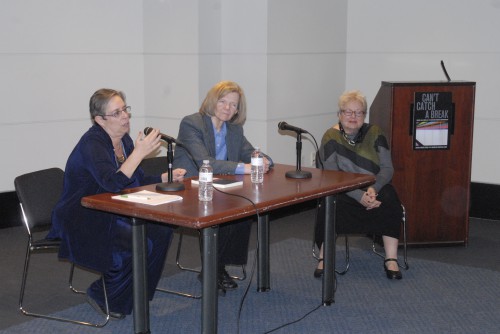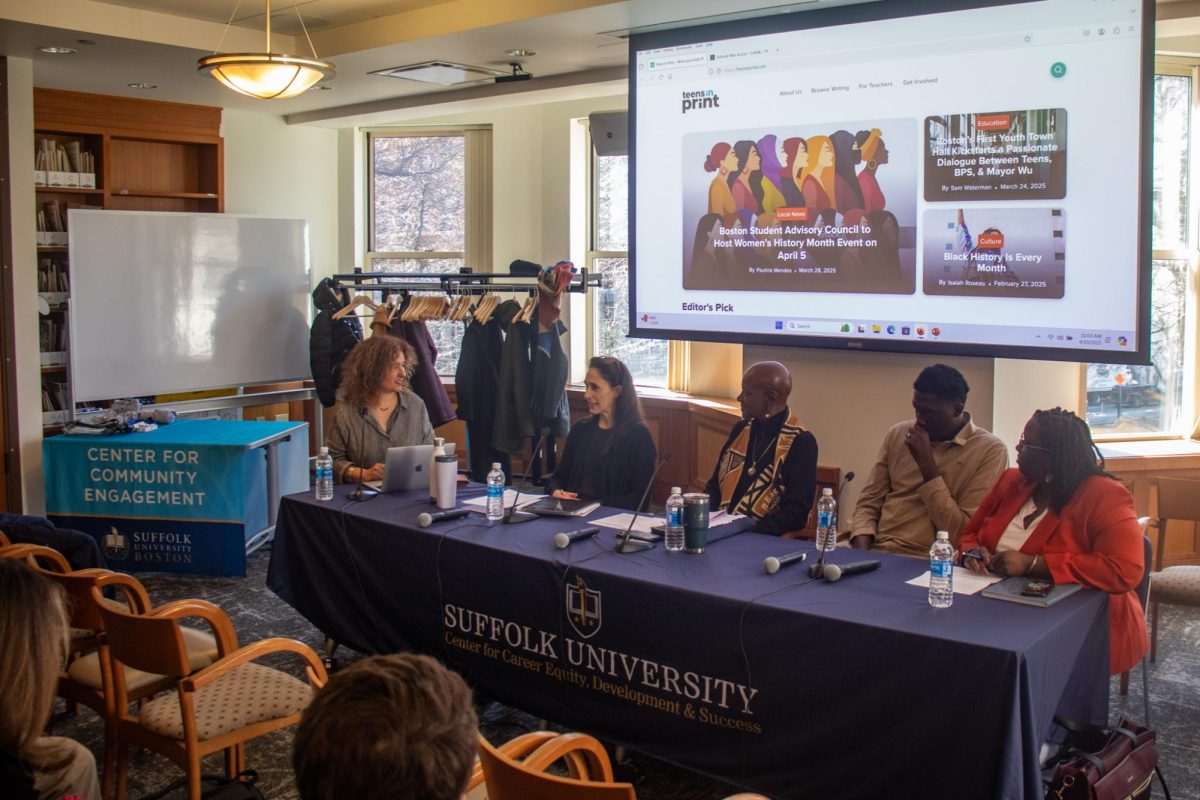Dozens of students flocked to the amenities room of 73 Tremont to hear Suffolk sociology professors Susan Sered and Maureen Norton-Hawk discuss their book, “Can’t Catch a Break: Gender, Jail, Drugs, and the Limits of Personal Responsibility,” which unveils daily struggles of women in Boston.
The book focuses on research from forty women, post-incarceration, struggling with mental health issues, addiction, homelessness, and abuse. The study, conducted more than five years, follows women who have been out of Massachusetts Correctional Institution in Framingham for one year.
Based on the results of this study, Sered said she believes there needs to be a change in policy and programmatic directions that build on people’s strengths, rather than punishing for weaknesses.
Kay Khan, a Massachusetts state representative, was present to discuss her involvement with the study. She is the founder and co-chair of a task force on Women in the Criminal Justice System.
Khan was interested in the mental health of women who come into the system.
“Eighty percent of the women in Framingham MCI today have a mental health open case,” she said.
MCI Framingham is also the only women’s prison in the state.
The study began around six years ago, when “just looking at numbers just wasn’t getting at the true picture of this population,” Norton-Hawk said. The two professors decided to begin a five-year, longitudinal study to get “a more qualitative” depiction of these women’s lives after they left prison, Norton-Hawk said.

Five years’ time was made possible by the willingness of the Kingston House and St. Francis House day center in Boston to work with them, and providing an incentive for women through MBTA monthly T passes if they volunteered for the study, according to Norton-Hawk. What made a difference was that the MBTA, “was still giving the passes to us five years throughout the study,” she said.
“This is a population that is sometimes living on the edge … our ability to follow them at each point got a little bit challenging,” Norton-Hawk said.
One issue within the study for Norton-Hawk was reliability, and trusting that prisoners were being honest, she said.
“Whether or not they were telling the truth … as they got more comfortable with us, their stories changed,” said Norton-Hawk, who added that the women would lie to them sometimes.
Sered also questioned what these women should be titled.
“They are not criminals,” she said, “virtually none of the women committed a significant crime.”
The most common reason they were incarcerated, Sered said, was probation violation.
“Maybe we could call them drug addicts, but that does not define who they are,” she said.
No matter what name they’re given, their stories are heard and can impact other women’s lives.
Khan explained this study is significant because it is vital to the future generations of these women and their children.
“It’s important to focus on the women because, “the women have the children,” she said. Since many of the children born from mothers within prisons end up in child services, “it’s really about trying to break the cycle.”
Sered’s top three policy changes to be addressed are improving the bail system, creating more low-income housing and the disenfranchisement of felons not being able to vote.
“We need to address the inequities of our corrections system.” Khan said, “It’s a really good example of how research that’s going on in universities to be very helpful to us in the legislature,” and helps to present evidence when pushing ideas forward, Khan said.
In the upcoming term, Khan is aiming to work on a piece of legislature, Section 35 in the the Massachusetts Constitution.
Chapter 123, section 35 states that the court may order a person to be committed for a period not to exceed 90 days in a Massachusetts correctional institution if they are an alcoholic or substance abuser likely of serious harm.
“What happens is they get civilly committed without crime, and the women end up at Framingham,” she said.
There, they go through an intense detox, but are isolated in a separate section of the prison and can’t get treatment, “because they aren’t allowed to mix with the general population,” said Khan. More facilities aimed toward rehabilitation are being opened to prevent the women from going to MCI.
Sered’s dream for the future is to make people think about how the challenges faced by these women “shed a light on the broader challenges we face as a society,” like living wages, abuse, and the growing rate of homelessness.
Sered currently updates her blog, www.susan.sered.name, with recent information on the women in the book.
Sered said she is still learning from the study, even though it is over. “I continue to learn, I continue to be surprised,” she said.
“Can’t Catch a Break,” is available at the bookstore.














